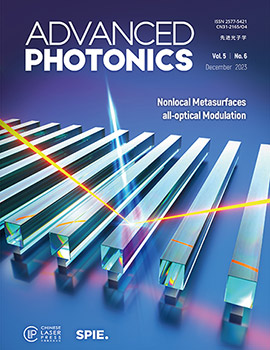Generating a sub-nanometer-confined optical field in a nanoslit waveguiding mode
IF 18.8
1区 物理与天体物理
Q1 OPTICS
引用次数: 2
Abstract
Abstract. We propose to generate a sub-nanometer-confined optical field in a nanoslit waveguiding mode in a coupled nanowire pair (CNP). We show that, when a conventional waveguide mode with a proper polarization is evanescently coupled into a properly designed CNP with a central nanoslit, it can be efficiently channeled into a high-purity nanoslit mode within a waveguiding length <10 μm. The CNP can be either freestanding or on-chip by using a tapered fiber or planar waveguide for input-coupling, with a coupling efficiency up to 95%. Within the slit region, the output diffraction-limited nanoslit mode offers an extremely confined optical field (∼0.3 nm × 3.3 nm) with a peak-to-background ratio higher than 25 dB and can be operated within a 200-nm bandwidth. The group velocity dispersion of the nanoslit mode for ultrafast pulsed operation is also briefly investigated. Compared with the previous lasing configuration, the waveguiding scheme demonstrated here is not only simple and straightforward in structural design but is also much flexible and versatile in operation. Therefore, the waveguiding scheme we show here may offer an efficient and flexible platform for exploring light–matter interactions beyond the nanometer scale, and developing optical technologies ranging from superresolution nanoscopy and atom/molecule manipulation to ultra-sensitivity detection.在纳米狭缝波导模式下产生亚纳米受限光场
摘要我们提出在耦合纳米线对(CNP)中以纳米狭缝波导模式产生亚纳米受限光场。我们发现,当具有适当偏振的传统波导模式瞬时耦合到具有适当设计的中心纳米狭缝的CNP中时,它可以在波导长度<10 μm的范围内有效地引导成高纯度的纳米狭缝模式。CNP可以是独立的,也可以是片上的,通过使用锥形光纤或平面波导进行输入耦合,耦合效率高达95%。在狭缝区域内,输出衍射受限的纳米狭缝模式提供了一个非常受限的光场(~ 0.3 nm × 3.3 nm),其峰背景比高于25 dB,并且可以在200 nm的带宽内工作。本文还对超快脉冲操作中纳米狭缝模式的群速度色散进行了简要的研究。与以往的激光配置相比,本文所展示的波导方案不仅在结构设计上简单明了,而且在操作上也更加灵活和通用。因此,我们在这里展示的波导方案可能为探索纳米尺度以外的光-物质相互作用提供一个高效和灵活的平台,并开发从超分辨率纳米显微镜和原子/分子操作到超灵敏度检测的光学技术。
本文章由计算机程序翻译,如有差异,请以英文原文为准。
求助全文
约1分钟内获得全文
求助全文
来源期刊

Advanced Photonics
OPTICS-
CiteScore
22.70
自引率
1.20%
发文量
49
审稿时长
18 weeks
期刊介绍:
Advanced Photonics is a highly selective, open-access, international journal that publishes innovative research in all areas of optics and photonics, including fundamental and applied research. The journal publishes top-quality original papers, letters, and review articles, reflecting significant advances and breakthroughs in theoretical and experimental research and novel applications with considerable potential.
The journal seeks high-quality, high-impact articles across the entire spectrum of optics, photonics, and related fields with specific emphasis on the following acceptance criteria:
-New concepts in terms of fundamental research with great impact and significance
-State-of-the-art technologies in terms of novel methods for important applications
-Reviews of recent major advances and discoveries and state-of-the-art benchmarking.
The journal also publishes news and commentaries highlighting scientific and technological discoveries, breakthroughs, and achievements in optics, photonics, and related fields.
 求助内容:
求助内容: 应助结果提醒方式:
应助结果提醒方式:


